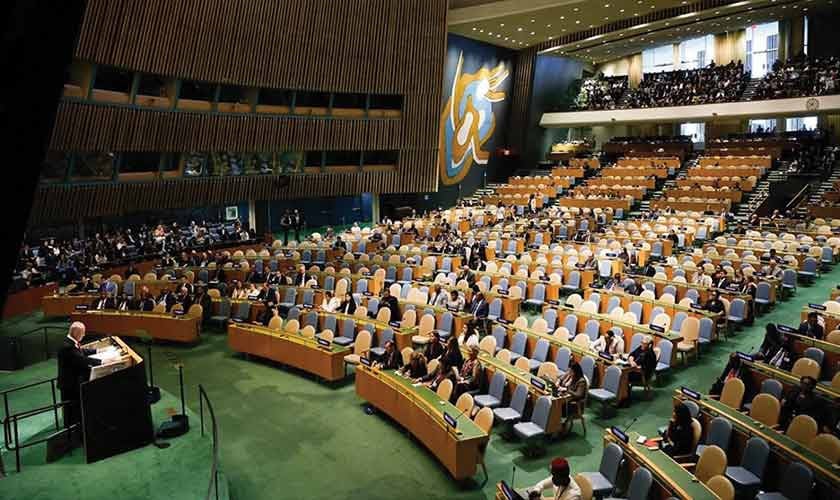The United Nations’ 80th General Assembly should have been the stage to discuss the future of peace in the age of artificial intelligence. Sadly, it turned out to be one of the most divisive sessions, dominated by discussions about Palestine rather than Israel.
The gathering proved that Palestine can’t be brushed aside as an idea, even with a world power backing it. Not many member states were eager to listen to Israeli Prime Minister Benjamin Netanyahu at the United Nations General Assembly in New York on September 26 — not least Hamas, the enemy he has been obsessed with for the last two years.
Netanyahu tried his best to address Hamas directly amid a boycott of his speech. The biased Western media counted the boycotters in dozens, even as Netanyahu spoke to an almost empty United Nations General Assembly Hall after diplomats from Arab and Muslim countries walked out alongside counterparts from several African and some European states.
The Israeli leader claimed that his intelligence had hacked cell phones across Gaza and used them to play his speech. However, he offered nothing new to the world or Hamas, only demanding (for the umpteenth time) the release of the remaining hostages.
Israel claims to be one of the world’s biggest technological forces in military applications and is fully backed by an even mightier United States. We have witnessed some of their high-tech gimmicks — exploding pagers, for instance. So why, despite their military muscle and technical superiority, have they failed to secure the release of the remaining hostages? How can they achieve the even more ambitious target of eliminating Hamas?
Of the 48 hostages left in Gaza, Netanyahu says 20 may still be alive. Despite being focused on a 41-kilometre stretch of land for two years, with high-tech drones and well-armed ground forces, Israel has been unable to secure the hostages’ release. Netanyahu has vowed not to rest until all hostages have been brought home.
During his speech, the lapel of the Israeli leader’s suit carried a large white badge displaying a QR code. He encouraged people to scan it, which led to a website about the Hamas attacks on October 7, 2023. This appeared to be a move to promote the perception that he is singularly focused on achieving the target he set for himself around 730 days ago.
However, the world remains confused about his ultimate objective: finishing Hamas, killing all Palestinians, or creating a Greater Israel.
The gimmickry continued in New York. According to Netanyahu’s office, they launched a public diplomacy campaign in the city, organizing billboards and trucks showcasing the message: “Remember October 7” in Times Square and around the UN building.
Yet, according to Pew Research Center’s April 2025 report, support for Israel among Americans has dropped significantly since the start of the Gaza war.
Despite these efforts, Netanyahu appeared more exposed than ever at the world’s biggest forum — increasingly isolated. His policy inflexibility has driven some of his past allies to abandon him. A growing number of Western countries now feel compelled to recognize Palestinian statehood.
Countries such as the United Kingdom, Canada, Australia, Portugal, and France have made the belated decision to recognize Palestine, much to Netanyahu’s displeasure.
Just days before his speech, on September 12, a vote took place in the UN General Assembly Hall. Out of 193 member states, 142 voted in favor of a declaration on the peaceful settlement of the question of Palestine and the implementation of the two-state solution with Israel, amid resounding applause.
The New York Declaration was the outcome of an international conference held in July at UN Headquarters, organized by France and Saudi Arabia.
Ten nations, including Israel and the United States, opposed the declaration, highlighting how limited Tel Aviv’s support has become. The other eight opposing countries were Argentina, Hungary, Micronesia, Nauru, Palau, Papua New Guinea, Paraguay, and Tonga. Twelve nations abstained during the vote.
Netanyahu’s diminishing support reflects a more fundamental change, not just among countries but in American public opinion.
Pew Research Center’s April 2025 report reveals that support for Israel among Americans has dropped sharply since the Gaza conflict began. Only 54 percent of Americans now consider the Israeli-Palestinian war relevant, an 11-point decline from 65 percent in January 2024. Similarly, those who believe the war is significant to U.S. national interests have fallen from 75 percent to 66 percent over the same period.
The United States, Israel’s staunchest ally, is showing signs of fatigue. Former President Donald Trump stated that any attempt by Israel to annex parts of the West Bank would be a red line for him.
Yet Netanyahu seems deaf to the message Western nations are sending through the growing recognition of Palestinian statehood: that enough is enough; Israel cannot have an indefinite license to kill; that there are limits—and those limits have been crossed.
His speech, filled with spin and allegations of anti-Semitism, was largely unheard. He is now isolated. The sooner he realizes this, the better it will be for him and for world peace.
According to Gaza’s Health Ministry, since October 7, 2023, over 65,000 Palestinians have been killed. The pressing question now is: how much more killing is needed?
Netanyahu’s speech lacked a roadmap. For those who hope for world peace, that was the most alarming element.
https://www.thenews.com.pk/tns/detail/1348318-no-method-to-netanyahus-madness


